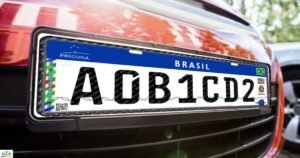In today’s digital age, where technology seems to permeate every aspect of our lives, concerns about privacy and security are at the forefront of many discussions. One question that often arises is whether someone can track you down simply by having your license plate number. Let’s delve into this topic to understand the intricacies involved.
Understanding License Plate Information
License plates are unique identifiers assigned to vehicles, typically by government agencies responsible for vehicle registration. They serve several purposes:
Identification: License plates help authorities and individuals identify vehicles.
Registration: They indicate that a vehicle has been properly registered with the relevant authorities.
Law Enforcement: License plates aid law enforcement agencies in various tasks, including tracking down stolen vehicles, enforcing traffic laws, and investigating crimes.
What Information is Available Through a License Plate?

When it comes to the information accessible through a license plate, it’s essential to distinguish between what the public can access and what law enforcement agencies or government authorities can obtain. Here’s a breakdown:
Public Access
In most jurisdictions, members of the public can’t access personal information about vehicle owners simply by having their license plate number. Publicly available information typically includes details such as the make, model, year, and color of the vehicle, along with its registration status.
Restricted Access
Law enforcement agencies and certain government entities have access to more detailed information. This may include the registered owner’s name, address, and other identifying information. Access to this data is typically restricted and subject to strict regulations to protect individuals’ privacy.
Can Ordinary Citizens Track Down Others Using License Plates?

While it’s technically possible for individuals to track down others using license plates, doing so legally and ethically is another matter entirely. Here are some avenues through which someone might attempt to find you based on your license plate:
Public Records Search
Some online services claim to provide access to vehicle registration information, including details about the owner, but it’s essential to consider their legality and accuracy.
For example, individuals might wonder about vehicle regulations like ‘What States Require License Plate Lights?‘ before relying on such services, as they may inadvertently breach privacy laws.
Social Media and Online Forums
People sometimes share information about their vehicles on social media platforms or online forums. By searching for your license plate number in these places, someone might uncover details about you, although this information may be limited.
Surveillance Cameras
In urban areas with extensive surveillance camera networks, it’s conceivable that someone could track your movements by capturing your license plate on camera at various locations. However, this would require access to multiple camera feeds and sophisticated tracking techniques.
The Legality and Ethics of License Plate Tracking
| Consideration | Description |
| Privacy Laws | Laws protecting individuals’ privacy may restrict unauthorized tracking. |
| Harassment | Using license plate tracking for harassment may lead to criminal charges. |
| Data Protection | Unauthorized use of vehicle registration data may violate data protection laws. |
| Authorization | Accessing personal information through license plates typically requires authorization. |
| Legal Consequences | Violating privacy laws or misusing license plate data can result in legal action. |
Respecting privacy and adhering to legal and ethical standards are paramount when considering license plate tracking.
FAQ’s
Is it legal for someone to track me down using my license plate?
Tracking someone down without authorization may violate privacy laws and lead to legal consequences.
Can I access personal information about a vehicle owner using their license plate?
Access to such information is typically restricted and may require authorization from law enforcement or government agencies.
What are the potential consequences of using license plate tracking for harassment?
Using license plate tracking for harassment can lead to criminal charges, including stalking or harassment.
Conclusion
While the idea of someone being able to track you down by your license plate may seem alarming, in practice, it’s much more complicated. While certain information about vehicles and their owners is publicly available, accessing personal information through a license plate typically requires authorization from law enforcement or government agencies.
Even if someone were able to obtain your license plate number, using it to track you down without your consent raises serious legal and ethical concerns. In most cases, such behavior would constitute a violation of privacy laws and could have severe consequences for the perpetrator.
While license plates serve as important identifiers for vehicles, respecting individuals’ privacy and adhering to legal and ethical standards should always take precedence.










